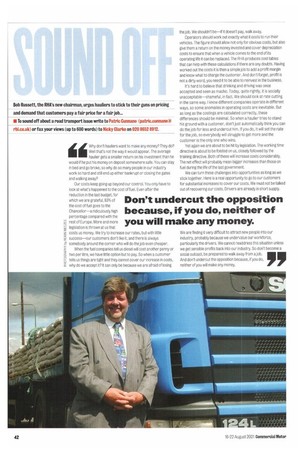d Why don't hauliers want to make any money? They do?
Page 42

If you've noticed an error in this article please click here to report it so we can fix it.
Well that's not the way it would appear. The average
haulier gets a smaller return on his investment than he would if he put his money on deposit somewhere safe. You can stay in bed and go broke, so why do so many people in our industry work so hard and still end up either bankrupt or closing the gates and walking away?
Our costs keep going up beyond our control. You only have to look at what's happened to the cost of fuel. Even after the reduction in the last budget, for which we are grateful, 83% of the cost of fuel goes to the Chancellor—a ridiculously high percentage compared with the rest of Europe. More and more legislation is thrown at us that costs us money. We try to increase our rates, but with little success—our customers don't like it, and there is always somebody around the corner who will do the job even cheaper.
When the fuel companies tell us diesel will cost another penny or two per litre, we have little option but to pay. So when a customer tells us things are tight and they cannot cover our increase in costs, why do we accept it? It can only be because we are afraid of losing the job. We shouldn't be—if it doesn't pay, walk away.
Operators should work out exactly what it costs to run their vehicles. The figure should allow not only for obvious costs, but also give them a return on the money invested and cover depreciation costs to ensure that when a vehicle comes to the end of its operating life it can be replaced. The BHA produces cost tables that can help with these calculations if there are any doubts. Having worked out the costs it is then a simple job to add a profit margin and know what to charge the customer. And don't forget, profit is not a dirty word, you need it to be able to reinvest in the business.
It's hard to believe that drinking and driving was once accepted and seen as macho. Today, quite rightly, it is socially unacceptable—shameful, in fact. We should look at rate cutting in the same way. I know different companies operate in different ways, so some anomalies in operating costs are inevitable. But as long as the costings are calculated correctly, these differences should be minimal. So when a haulier tries to stand his ground with a customer, don't just automatically think you can do the job for less and undercut him. If you do, it will set the rate for the job, so everybody will struggle to get more and the customer is the only one who wins.
Yet again we are about to be hit by legislation. The working time directive is about to be foisted on us, closely followed by the training directive. Both of these will increase costs considerably. The net effect will probably mean bigger increases than those on fuel during the life of the last government.
We can turn these challenges into opportunities as long as we stick together. Here is a real opportunity to go to Our customers for substantial increases to cover our costs. We must not be talked out of recovering our costs. Drivers are already in short supply.
We are finding it very difficult to attract new people into our industry, probably because we undervalue our workforce, particularly the drivers. We cannot readdress this situation unless we get sensible profits back into our industry. So don't become a social outcast, be prepared to walk away from a job.
And don't undercut the opposition because, if you do, neither of you will make any money.
























































































































